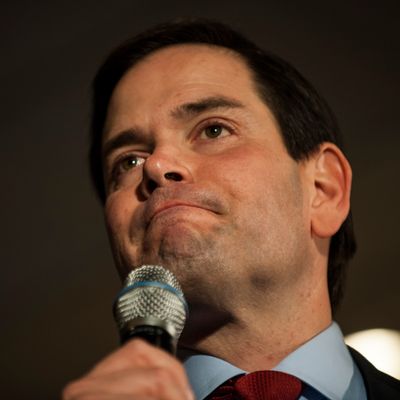
It seems like ages ago, but it was only a few days, when Marco Rubio was poised to seize back the inside lane of the Republican nomination race. In Thursday night’s debate, he sprung a barrage of attacks on Donald Trump, following them up the next day with personal ridicule that thrilled conservatives. It looked for all the world like the fabled party deciding — belatedly, but deciding nonetheless — to unite behind him as the sole alternative to the threat posed by Trump. In the days since, Rubio’s plan has come to pieces. Trump rolled out a series of endorsements from such party luminaries as New Jersey governor Chris Christie, Arizona governor Jan Brewer, and Alabama senator Jeff Sessions. Then on Monday, a series of national polls showed Trump’s support soaring into the forties. Then finally, the collapse culminated in a humiliating 1-for-11 showing for Rubio on Super Tuesday.
For all its struggles at vote-garnering, Rubio’s campaign has excelled at one thing: winning the nebulous “expectations game.” In part because Establishment Republicans were pulling so hard for him and supplying reporters with encouraging quotes, Rubio’s campaign managed to turn a string of defeats into positive press coverage touting the wins that were always soon to come. This time, they may have slipped up. Tuesday, reports leaked that Rubio’s campaign was telling supporters it could win four states. This turned his 1-for-11 showing from a disappointment into an absolute debacle. (Worse still, the evening began with Rubio challenging for a symbolic win in Virginia, and waves of excitement among his enthusiasts, giving the ensuing defeat more crushing force.)
Heading into Tuesday night, Rubio’s campaign had rallied conservative activists and Republican leaders by making the following arguments: Trump is a dangerous authoritarian who poses a dire threat to the Republic; only Rubio can unite the party and the conservative movement behind him; and other Republicans should get out of the way to let Rubio have a clear shot to defeat Trump.
Super Tuesday shook the logic undergirding those claims. Trump delivered a sober-sounding address, focusing more heavily on economic populism and downplaying themes of social reaction, making him sound (at least for one night) like a far more formidable general-election prospect. He condescended to Rubio by praising Cruz (“Ted has a shot because at least he’s won a little bit”). Rubio’s miserable performance left him with much less to show than Ted Cruz, who has now won more states and more delegates than Rubio. Rubio’s supporters are now making the case against his rivals dropping out (perhaps because the argument could easily be turned against their own man).
But their new Rubio victory scenario is grim, involving a long fight all the way to the convention, with the candidates splitting the vote to deny Trump a majority, in hopes that they can band together and deny him the nomination in Cleveland. The vision of party elite conspiring to seize the nomination from the choice of its voters — in place of what is normally a scripted four-day national television commercial — is hardly appetizing.
Lindsey Graham, appearing on CBS, actually floated the possibility of the party rallying behind Cruz rather than Rubio to stop Trump. The logic of insisting upon Rubio never fully cohered in the first place. Republicans were insisting Trump is historically dangerous, a party-shattering American Mussolini, who must be stopped at all costs, but the alternative could not be Cruz because, well, he’s annoying. If they needed a candidate who could neutralize Trump’s anti-immigration appeal, Cruz presents a clear benefit over Rubio.
Obviously, one man is not a stampede, especially when that man is Lindsey Graham, who is often wandering off in the opposite direction from the rest of the party herd. But his apostasy shows just how badly recent days have tarnished Rubio’s standing as a white knight. Rubio now faces two weeks before his self-declared must-win in his home state of Florida, where he trails Trump by double-digit margins, and where Trump is reported to be on the verge of receiving an endorsement from the governor. Any other candidate who failed as many times as Rubio would have left the race in humiliation. Only his status as Establishment darling allows him to persist. But he is farther away from clearing the field than he has found himself in a long time. He is closer to becoming a joke than the front-runner.






























